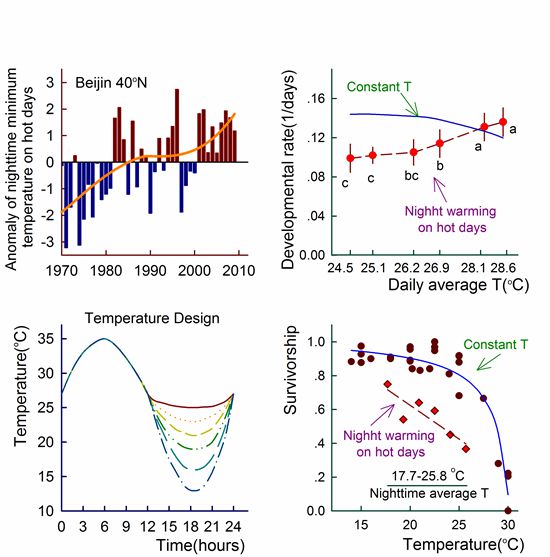分享到
IPP research paper on climate change ecology selected as the F1000Prime
The research paper, with the title of “Night warming on hot days produces novel impacts on development, survival and reproduction in a small arthropod” published on Journal of Animal Ecology (Volume 83, Issue 4, p769-778, 2014), has been selected as the F1000Prime on September 9th, 2014.
“…the previous research on climate change impacts has rarely considered the biological consequences of these asymmetric changes in diurnal and seasonal patterns of temperature. In this study, night-biased warming could dampen some pest insect outbreak cycles, rather than increase pest outbreaks as predicted by models that use symmetric increases in day- and night-time temperatures”, as the recommendation says.
“We are glad that our paper has been selected by Faculty of 1000”, says Professor Ma, corresponding author of the article and a professor at the Institute of Plan Protection (IPP) of Chinese Academy of Agricultural Sciences (CAAS). “We were indeed excited when obtaining the new finding at initial, fortunately it also has been recognized by the peers now”, said he. Professor Ma and his research team have been focusing in climate change for nearly about 10 years, and published series of papers on arthropod performance and adaptation in response to climate change.
“…the previous research on climate change impacts has rarely considered the biological consequences of these asymmetric changes in diurnal and seasonal patterns of temperature. In this study, night-biased warming could dampen some pest insect outbreak cycles, rather than increase pest outbreaks as predicted by models that use symmetric increases in day- and night-time temperatures”, as the recommendation says.
“We are glad that our paper has been selected by Faculty of 1000”, says Professor Ma, corresponding author of the article and a professor at the Institute of Plan Protection (IPP) of Chinese Academy of Agricultural Sciences (CAAS). “We were indeed excited when obtaining the new finding at initial, fortunately it also has been recognized by the peers now”, said he. Professor Ma and his research team have been focusing in climate change for nearly about 10 years, and published series of papers on arthropod performance and adaptation in response to climate change.

In this paper, Professor Ma and his colleagues discovered that an asymmetric increase in night-time temperatures (NTs) on hot days is one of the main features of global climate change. But the biological effects of an increased night-time temperature combined with high daytime temperature remains unclear. Six thermal regimens to simulate NTs on hot days were used to investigate the effects of night warming on life-history traits of the English grain aphid Sitobion avenae. When compared to expectations based on constant temperatures, night warming raised the optimum temperature for development by 3°C, in contrast to results from experiments where temperature variability was altered symmetrically or in a parallel manner. Night warming also reduced aphid survival under heat from 75% to 37% and depressed adult performance by up to 50%. Overall, night warming exacerbated the detrimental effects of hot days on the intrinsic rate of population increase, which was predicted to drop by 30% when night-time minimum temperatures exceeded 20°C. These novel findings on development challenge the “Kaufmann effect”, suggesting this is inapplicable to night warming likely to be encountered in nature. Although many average temperature models predict increasing pest outbreaks, these results suggest that outbreaks of some species might decrease due to the effects of night warming on population dynamics.
The F1000Prime, launched in 2002, is a continually updated collection of over 145,000 recommendations of top articles in biology and medicine, contributed by the Faculty of 1000’s scientists and clinical researchers. Covering more than 3,700 peer-reviewed journals and updated daily, the data are easily navigated by subject area or advanced search.
In the past several years, 2 research papers from IPP-CAAS were selected in the F1000Prime.
More details are available on the bellow links:
Link to the recommendation:
http://f1000.com/prime/718221594?subscriptioncode=1ea9e9c3-b4b1-4039-b5ae-660f121383f1
Link to the article:
http://onlinelibrary.wiley.com/doi/10.1111/1365-2656.12196/abstract;jsessionid=4F2C2C1A849678BE8B0D1695BDBFF2BD.f01t01
The F1000Prime, launched in 2002, is a continually updated collection of over 145,000 recommendations of top articles in biology and medicine, contributed by the Faculty of 1000’s scientists and clinical researchers. Covering more than 3,700 peer-reviewed journals and updated daily, the data are easily navigated by subject area or advanced search.
In the past several years, 2 research papers from IPP-CAAS were selected in the F1000Prime.
More details are available on the bellow links:
Link to the recommendation:
http://f1000.com/prime/718221594?subscriptioncode=1ea9e9c3-b4b1-4039-b5ae-660f121383f1
Link to the article:
http://onlinelibrary.wiley.com/doi/10.1111/1365-2656.12196/abstract;jsessionid=4F2C2C1A849678BE8B0D1695BDBFF2BD.f01t01
By Zhang Bo
zhangbo05@caas.cn
zhangbo05@caas.cn
Latest News
-
 Apr 18, 2024Opening Ceremony of the Training Workshop on Wheat Head Scab Resistance Breeding and Pest Control in Africa Held in CAAS
Apr 18, 2024Opening Ceremony of the Training Workshop on Wheat Head Scab Resistance Breeding and Pest Control in Africa Held in CAAS -
 Apr 03, 2024IPPCAAS Co-organized the Training Workshop on Management and Application of Biopesticides in Nepal
Apr 03, 2024IPPCAAS Co-organized the Training Workshop on Management and Application of Biopesticides in Nepal -
 Mar 28, 2024Delegation from the School of Agriculture and Food Science of University College Dublin, Ireland Visit to IAS, CAAS
Mar 28, 2024Delegation from the School of Agriculture and Food Science of University College Dublin, Ireland Visit to IAS, CAAS -
 Mar 25, 2024Director of World Food Prize Foundation visited GSCAAS
Mar 25, 2024Director of World Food Prize Foundation visited GSCAAS -
 Mar 20, 2024Institute of Crop Sciences (ICS) and Syngenta Group Global Seeds Advance Collaborative Research in the Seed Industry
Mar 20, 2024Institute of Crop Sciences (ICS) and Syngenta Group Global Seeds Advance Collaborative Research in the Seed Industry
